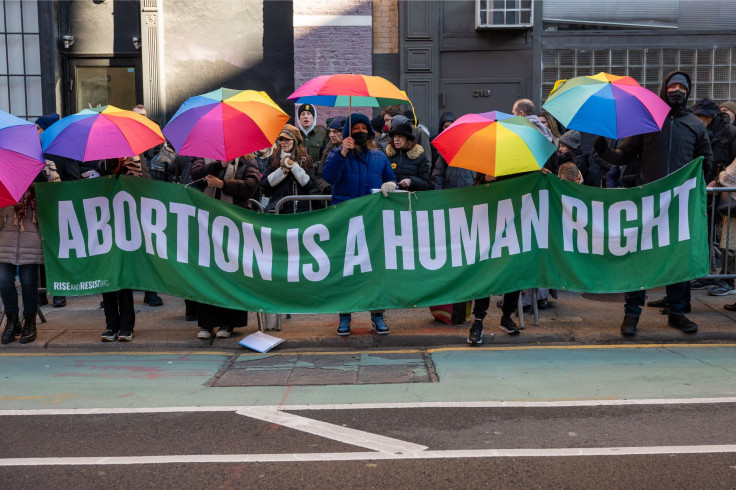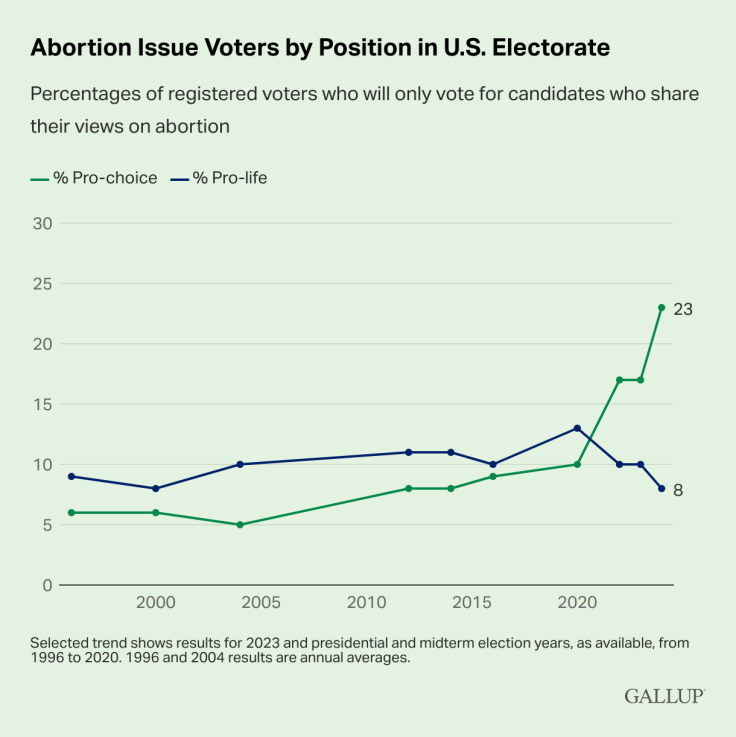
In the 2024 election, citizens of 10 states voted on amendments related to abortion rights, seeking to secure or limit reproductive freedom in their state constitutions.
The introduction of this topic to the ballot came two years after the landmark U.S. Supreme Court decision that overturned Roe v. Wade, giving each state the power to decide on abortion access.
An Associated Press-NORC poll conducted in June of this year reveals that 70% of Americans believe abortion should be legal in all or most cases. However, several states have already implemented or reinforced pre-Roe v. Wade bans, limiting or banning the procedure in whole or in part.
How did the abortion referendums turn out?
On Election Day, seven states decided to protect reproductive rights in their constitutions, while in three states, the initiatives failed to gain sufficient support.
Arizona: APPROVED
In April 2024, Arizona implemented a near-total ban on abortion and passed a law criminalizing doctors who perform or assist in the procedure. In August, the Secretary of State's office certified enough signatures to place the Arizona Abortion Access Act, or Proposition 139, on the ballot.
Proposition 139 proposed voters recognize the fundamental right of every person to receive an abortion before fetal viability, which is typically established around 24 weeks gestation. Ultimately, Arizonans voted to protect this right.
Colorado: PASSED
In May 2024, the Abortion Rights and Health Insurance Coverage Initiative - known as Amendment 79, gained enough signatures to be included on the ballot. This amendment seeks to ensure that abortion rights are included in the Colorado Constitution and to allow the use of public funds for abortion services.
While abortion is already legal in Colorado, the amendment was proposed to prevent future administrations from limiting or eliminating this right. The amendment also seeks to overturn a 1984 measure that prevents health insurance from covering abortion for public employees and individuals with public insurance.
Florida: NOT APPROVED
In May 2024, Florida implemented a ban on abortion after only six weeks of pregnancy, before many women could detect their pregnancy.
Amendment 4, known as the Limiting Government Interference in Abortion Amendment, proposed to enshrine reproductive freedom in the state constitution. This measure stated that "no law shall prohibit, criminalize, delay, or restrict abortion before fetal viability or when necessary to protect the health of the patient, as determined by her health care provider."
However, this initiative failed to get the votes needed to pass. In Florida, referendums only pass with more than 60% of the vote. The amendment received 57% in favor.
Maryland: APPROVED
In Maryland, abortion is currently legal before fetal viability. In this election, voters decided on the Reproductive Freedom referendum proposal, which called for adding a section to the state constitution to guarantee this right.
The referendum proposed to ensure the right of individuals to make decisions about their pregnancy, including the right to continue or terminate it. Maryland voters supported this measure, reaffirming the state's commitment to reproductive freedom.
Missouri: APPROVED
In 2022, Missouri activated a "trigger" law that banned abortion almost entirely, except in specific medical emergencies. However, in the 2024 election, Missouri citizens voted on Amendment 3, a proposal that offered to protect abortion rights up to fetal viability.
In addition to guaranteeing access to abortion, the amendment ensured the right to receive other reproductive health services as a fundamental right. Ultimately, Missouri voters approved the amendment, guaranteeing greater protections in the state constitution.
Montana: PASSED
In Montana, abortion is legal up to fetal viability. During this election, Montana voters approved Initiative CI-128, which proposed to amend the state constitution to guarantee the right to decide about one's pregnancy.
This initiative not only protects access to abortion up to fetal viability but also includes language to prohibit government intervention if medically necessary to protect the life or health of the patient. Voters supported this measure, solidifying the right to reproductive autonomy in Montana.
Nebraska: NOT APPROVED
In Nebraska, abortion is currently prohibited after 12 weeks of pregnancy, with exceptions in cases of rape, incest, or to save the life of the mother.
During the 2024 election, Nebraskans faced two opposing propositions on the ballot. The first sought to enshrine the right to abortion in the state constitution up to fetal viability or when necessary to save the life of the mother. The second proposal, on the other hand, proposed to prohibit abortion in the second and third trimesters, except in cases of medical emergency or situations of rape or incest.

How does the abortion rights map look now in the United States?
In Oregon and Vermon, abortion is guaranteed without time limits. It is protected by the Constitution and is covered by state Medicaid funds and private health insurance. Oregon, in addition, has a shield law to protect abortion providers from investigations by other states, where it is prohibited.
New Mexico, California, Minnesota, New York, New Jersey, Maryland, Alaska, and Hawaii have abortion rights. In California, one of the states with the largest Latino population, the state constitution protects the right to abortion, and Medicaid and private health insurance cover it. Still, it is prohibited after the viability of the fetus, a time that science fixes at around the 23rd week of pregnancy.
Washington, Montana, Illinois, Michigan, Maine, Massachusetts, Connecticut, and now Colorado, have state funding.
It was already legal in Nevada, New Hampshire, Rhode Island, and Delaware, but with restrictions. Arizona has now joined the list.
The states with restrictive laws are Wyoming, Kansas, Iowa, Wisconsin, Ohio, Pennsylvania, and Virginia, where their legislation prohibits abortion from 22 to 24 weeks. In the case of Pennsylvania, patients are required to wait 24 hours after counseling to have an abortion, and Medicaid and private health insurance coverage is prohibited except in particular circumstances.
In Utah, Nebraska, North Carolina, and Georgia, abortion rights are minimal. It is virtually prohibited in Florida, Texas, Idaho, North Dakota, South Dakota, Oklahoma, Missouri, Arkansas, Louisiana, Indiana, Kentucky, West Virginia, Tennessee, South Carolina, Mississippi, and Alabama.
© 2024 Latin Times. All rights reserved. Do not reproduce without permission.









